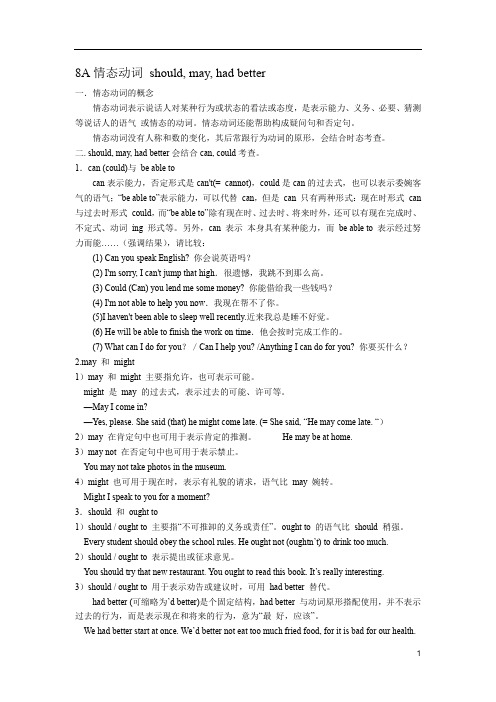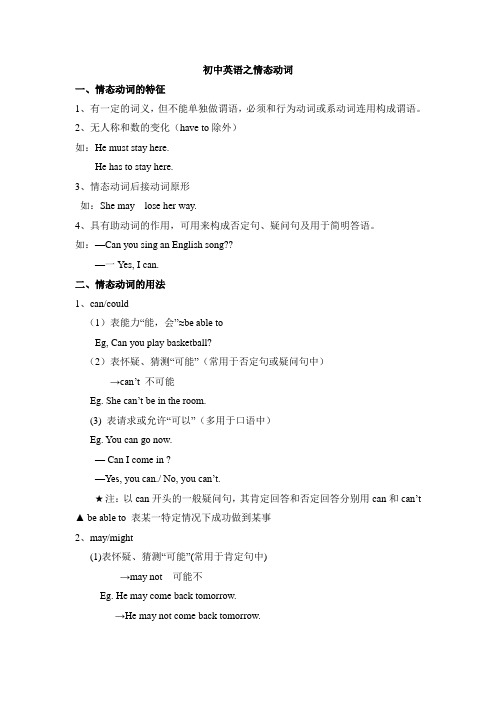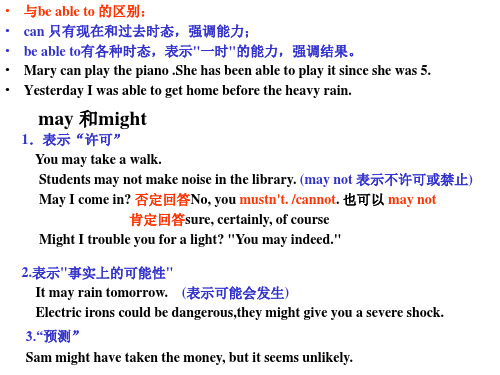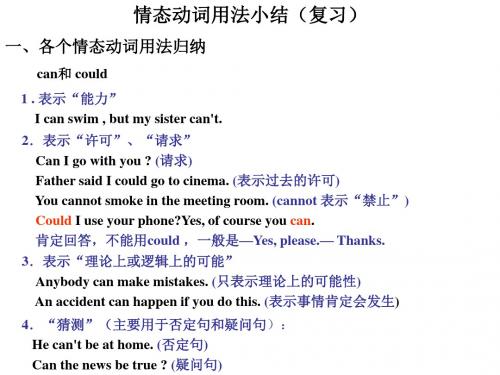情态动词 牛津英语
- 格式:pptx
- 大小:80.48 KB
- 文档页数:14

牛津高中英语语法复习:情态动词牛津高中英语语法复习:情态动词1 情态动词的语法特征1)情态动词不能表示正在发生或已经发生的事情,只表示期待或估计某事的发生。
2)情态动词除ought 和have 外,后面只能接不带to 的不定式。
3)情态动词没有人称,数的变化,即情态动词第三人称单数不加-s。
4)情态动词没有非谓语形式,即没有不定式,分词,等形式。
2 比较can 和be able to1)can could 表示能力;可能(过去时用could),只用于现在式和过去式(could)。
be able to可以用于各种时态。
They will be able to tell you the news soon. 他很快就能告诉你消息了。
2)只用be able toa. 位于助动词后。
b. 情态动词后。
c. 表示过去某时刻动作时。
d. 用于句首表示条件。
e. 表示成功地做了某事时,只能用was/were able to,不能用could。
He was able to flee Europe before the war broke out.= He managed to flee Europe before the war broke out.注意:could不表示时态1)提出委婉的请求,(注意在回答中不可用could)。
--- Could I have the television on?--- Yes, you can. / No, you can’t.2)在否定,疑问句中表示推测或怀疑。
He couldn’t be a bad man.他不大可能是坏人。
3 比较may和might1)表示允许或请求;表示没有把握的推测;may 放在句首,表示祝愿。
May God bless you!He might be at home.注意:might 表示推测时,不表示时态。
只是可能性比may 小。
2)成语:may/might as well,后面接不带to 的不定式,意为”不妨”。

8A情态动词should, may, had better一.情态动词的概念情态动词表示说话人对某种行为或状态的看法或态度,是表示能力、义务、必要、猜测等说话人的语气或情态的动词。
情态动词还能帮助构成疑问句和否定句。
情态动词没有人称和数的变化,其后常跟行为动词的原形,会结合时态考查。
二. should, may, had better会结合can, could考查。
1.can (could)与be able tocan表示能力,否定形式是can't(= cannot),could是can的过去式,也可以表示委婉客气的语气;“be able to”表示能力,可以代替can,但是can 只有两种形式:现在时形式can 与过去时形式could,而“be able to”除有现在时、过去时、将来时外,还可以有现在完成时、不定式、动词ing 形式等。
另外,can 表示本身具有某种能力,而be able to 表示经过努力而能……(强调结果),请比较:(1) Can you speak English? 你会说英语吗?(2) I'm sorry, I can't jump that high.很遗憾,我跳不到那么高。
(3) Could (Can) you lend me some money? 你能借给我一些钱吗?(4) I'm not able to help you now.我现在帮不了你。
(5)I haven't been able to sleep well recently.近来我总是睡不好觉。
(6) He will be able to finish the work on time.他会按时完成工作的。
(7) What can I do for you?/Can I help you? /Anything I can do for you? 你要买什么?2.may 和might1)may 和might 主要指允许,也可表示可能。

初中英语之情态动词一、情态动词的特征1、有一定的词义,但不能单独做谓语,必须和行为动词或系动词连用构成谓语。
2、无人称和数的变化(have to除外)如:He must stay here.He has to stay here.3、情态动词后接动词原形如:She may lose her way.4、具有助动词的作用,可用来构成否定句、疑问句及用于简明答语。
如:—Can you sing an English song??—一Yes, I can.二、情态动词的用法1、can/could(1)表能力“能,会”≈be able toEg, Can you play basketball?(2)表怀疑、猜测“可能”(常用于否定句或疑问句中)→can’t 不可能Eg. She can’t be in the room.(3) 表请求或允许“可以”(多用于口语中)Eg. You can go now.— Can I come in ?—Yes, you can./ No, you can’t.★注:以can开头的一般疑问句,其肯定回答和否定回答分别用can和can’t ▲ be able to 表某一特定情况下成功做到某事2、may/might(1)表怀疑、猜测“可能”(常用于肯定句中)→may not 可能不Eg. He may come back tomorrow.→He may not come back tomorrow.(2)表请求或许可“可以”Eg .— May I come in ?—Yes, you can No, you can’t/ mustn’t.★注:may表请求,用于主语为第一人陈的一般疑问句时,其否定回答用must’t 或can’t,不用may not ,译为“不可以、不许、禁止”▲maybe 与maybeMaybe常置于句首=perhaps,may be 常置于句中≈ be如:Maybe he is a student.He may be a student.3、Must(1)表猜测“一定”(一般用于肯定句)→否定:can’t “不可能”—There is someone knocking on the door,—It must be June.→否定:It can’t be June.(2)表“必须”→否定:needn’t/don’t have toEg. You must finish the work today.→否定:You needn’t finish the work today.—Must I go there with you ?— Yes,you must.(No , you needn’t/ don’t have to)★注:—Must I ……?— Yes,you must.(No , you needn’t/ don’t have to)▲must 与have tohave/has to 强调客观需要“必须,不得不”Must 表主管意愿“必须”4、should表义务、责任“应当”=ought to do(否定:ought not to do)Eg. As students, we should study hard.5、Shall用于第一人称,表征求意见、询问Shall I open the door?用于第二、三人称,表警告、名利、允诺等You shall hand in your papers when the bell rings.6、need(1)作实义动词:有人称和数的变化,可用于肯定、否定或疑问句Eg, He needs to finish the work with his sister.→ He doesn’t need to ……→ Does he need to finish……?▲主动形式表被动意义need doing=need to be doneEg. The bike needs to be repaired.=the bike needs repairing.(2)作情态动词无人称和数的变化;只用于否定句或疑问句中Eg He needn’t go there now.★注:—Need he go there now?—Yes, he must./No, you needn’t.7、Will 用于第二人称,表询问、请求,也可表示现在的意愿,如:Will you pass me the book?8、would 用于表示过去的意愿或委婉的询问,如:Would you tell me the way to the post office?2014年全国部分省市中考英语试题汇编:单项选择—情态动词和系动词一、情态动词【2014铜仁】—Must I water the flowers now, mum?—No, you . You do it later.A. mustn’t; mustB. mustn’t; ma yC. needn’t; mayD. needn’t; must【答案】【2014连云港】—I know by what time you want the project to be done?—By the day after tomorrow. you finish it on time?A. May; CanB. Must; NeedC. Could; MustD. Need; Would【答案】A【2014长沙】—Who’s singing in the garden?—It be Mr. Brown. He always practices singing at this time.A. mustB. can’tC. need【答案】A【2014河北】I ______ follow you. Would you please repeat it?A. can’tB. mustn’tC. needn’tD. shouldn’t 【答案】A【2014北京】—Must I hand in my homework now, Mr. Smith?—No, you _______.A. can’tB. shouldn’tC. wouldn’tD. needn’t 【答案】D【2014扬州】—Excuse me, may I keep the book a little longer?—Sorry. You ________ return it today.A. mustB. mustn’tC. canD. can’t【答案】A【2014黔西南州】—Is the man over there Mr. Brown?—It ______ him. He has gone to Brazil to watch the 2014 FIFA World Cup.A. may notB. can’t beC. shouldn’tD. mustn’t【答案】B【2014重庆市A】Children _______ si t in the front seat of a car. It’s too dangerous.A. needB. needn’tC. mustD. mustn’t 【答案】D【2014安徽】—I forgot to bring my dictionary. Could I use yours?—Yes, you ______.A. canB. mustC. couldD. should【答案】A [来源:学,科,网Z,X,X,K]【2014重庆市B】The man is feeling much better now, so you ______ call a doctor.A. needn’tB. can’tC. mustn’tD. shouldn’t【答案】A【2014杭州】If you _____ smoke, please go outside.A. ca nB. mayC. mustD. might【答案】【2014东营】After you read the article “Why fast food is slowly killing you”, you stopeating fast food.A. canB. mayC. have toD. should 【答案】B【2014天津】Look at the “No parking” sign. You _____park your car here.A. shouldB. mustC. needn’tD. mustn’t【答案】D【2014南昌】We ______ pay to get into the concert. It's free.A. can’tB. mustn’tC. might notD. don’t have to 【答案】D【2014苏州】—May I take this magazine out of the reading room?—No, you _______. You read it in here.A. mightn’tB. won’tC. needn’tD. mustn’t【答案】D【2014宁波】—_______ you leave now? You only arrived here an hour ago.—Sorry, but so much homework is waiting for me.A. MayB. MustC. CanD. Might【答案】B【2014甘肃白银】—Must I go to law school and be a lawyer like you, dad?—No, you _______, son. You’re fre e to make your own decision. [来源:学科网ZXXK]A. can’tB. mustn’tC. shouldn’tD. needn’t【答案】D【2014丽水】Here is my phone number. You _______ call me anytime you like.A. mustB. canC. shouldD. need 【答案】B【2014绍兴】—Let’s go climbing, shall we?—You _______ be joking! Don’t you know I’m afraid of high places?A. mayB. canC. mustD. should 【答案】C【2014台州】—Are you interested in shopping online?—Not so much. We _______ see real products but pictures.A. shouldn’tB. can’tC. mustn’tD. needn’t 【答案】B【2014泰安】—Could you please have a walk with me?—Sorry, I _______. I have something important to do now.[来源:]A. mustn’tB. needn’tC. can’tD. may not【答案】C【2014威海】—Bob, where is Linda?—She _______ be in the library, bu t I am not sure.A. mustB. mayC. needD. has to 【答案】B【2014滨州】—Must we take out the trash now?—_______. You can do it after class.A. Yes, you mustB. No, you can’tC. Yes, you mayD. No,you needn’t[来源:学科网]【答案】D【2014德州】—Lingling, can I use your e-dictionary?—Sure. But you _______ return it after class.A. mustB. canC. mayD. would【答案】A【2014菏泽】—Look, someone left a book.—Oh, yeah… This book _______ be Kitty’s. Only she likes to read this kind ofbooks.A. canB. mustC. mayD. might【答案】B【2014聊城】—Is the long-haired man Bruce?[来源:学|科|网]—No, it _______ be him. He’s in New York now.A. can’tB. mustn’tC. needn’tD. may not【答案】A【2014潍坊】People _______ wait until the traffic becomes green. That’s the traffic rule.A. mustB. canC. needD. may 【答案】A二、系动词【2014潍坊】—What will a science museum be like if you are asked to build one?—I hope it will _______ like a book.A. tasteB. soundC. lookD. smell 【答案】C【2014昆明】—The medicine _______ awful. I can’t stand it.[来源:] —I know, Jimmy. But it’s helpful for you.A. tastesB. eatsC. drinksD. takes【答案】A【2014河北】Mom is cooking dinner. It ______ so nice.A. smellsB. tastesC. feelsD. sounds【答案】A【2014安徽】Mum, what are you cooking? It ______ so sweet.A. tastesB. feelsC. soundsD. smells 【答案】D【2014湖北咸宁】—What are you going to do this weekend?—I together with my classmates going to climb Mount Qian.A. isB. amC. areD. were【答案】B【2014宁波】This kind of peach looks really nice, but it _______ very sour.A. tastesB. looksC. feelsD. sounds 【答案】A【2014德州】The vegetable soup _______ delicious. Can I have more?A. looksB. tastesC. soundsD. feels 【答案】B【2014丽水】The skirt _______ as if it is made of silk.A. soundsB. tastesC. feelsD. smells【答案】C【2014泰安】—What _______ the number of the students in your school?—About two thousand. A number of them _______ from the countryside.A. is; areB. is: isC. are; isD. are: are【答案】A【2014湖州】Listen, the country music ______ so sweet.A. smellsB. soundsC. feelsD. looks【答案】B【2014聊城】I like the dress very much. It _______ comfortable.A. feelsB. tastesC. soundsD. smells【答案】A【2014菏泽】—How do you like the fish I cooked for you?—I haven’t had it yet. Howe ver, it _______ good.A. smellsB. tastesC. soundsD. feels 【答案】A。

牛津版六年级英语下册各单元情态动词汇总单元一:Greetings- Can you...?- May I...?- Could I...?- Would you like to...?- Do you want to...?单元二:Hobbies- Can you play...?- May I join you?- Could we go...?- Would you like to play...?- Do you want to try...?单元三:Family- Can you help me...?- May I introduce...?- Could you tell me...?- Would you mind...?- Do you want to meet...?单元四:Food and Drinks - Can I have...?- May I taste...?- Could I try...?- Would you like some...?- Do you want to eat...?单元五:Animals- Can animals...?- May I pet...?- Could they be...?- Would you like to see...?- Do you want to feed...?单元六:Weather- Can you see the...?- May I bring an...?- Could we stay...?- Would you like to go...?- Do you want to play in the...?单元七:Jobs- Can you be a...?- May I work as a...?- Could I help you...?- Do you want to be an...?单元八:Places- Can we visit...?- May I go to...?- Could we stay at...?- Would you like to go to...? - Do you want to explore...?单元九:Transportation - Can we take...?- May I ride...?- Could I have a ride...?- Would you like to drive...? - Do you want to travel by...?单元十:Daily Routines - Can you do...?- May I help you...?- Could you tell me...?- Would you mind if I...?- Do you want to learn...?单元十一:Health- Can I get some...?- May I take...?- Could I have a check-up...? - Would you like to try...?- Do you want to exercise...?单元十二:Celebrations- Can we celebrate...?- May I join the...?- Could we have a party...?- Would you like to participate in...?- Do you want to enjoy...?以上是牛津版六年级英语下册各单元情态动词的汇总。


新版7B Unit7 AbilitiesGrammar---情态动词一.can, could和maycan/could的基本用法1.表示能力,意为“能,会”。
表示现在的能力用can,表示过去的能力用could。
此时可以用短语be able to与之替换。
如:She can speak French very well. 她说法语说得很好。
=She is able to speak French.I could catch the bus, but I didn’t want to. 我当时能赶上车的,但是我没想赶。
2.表示许可,意为“可以”。
表示请求别人允许自己做某事时,两者都可用,但could表示一种委婉语气。
表示允许别人做某事时,一般只用can,不用could。
如:Can I borrow your book?我能借你的书吗?Could you help me? 你能帮助我吗?3.can/could表示怀疑、猜测时,意为“可能”。
can’t/couldn’t意为“不可能”。
如:He can’t/couldn’t be only fifty.他不可能只有五十岁。
This can’t be finished by her.这不可能是她完成的。
4.以can开头的一般疑问句,其肯定回答和否定回答分别用can和can’t;以could开头的一般疑问句,其肯定和否定回答分别用could和couldn’t。
但表示允许别人做某事时,其回答用can,而不用could。
如:----Could I use your pen? ----我可以用你的钢笔吗?----Yes, of course you can. ----当然可以。
5.may的基本用法表示请求或许可,意为“可以”,一般可以与can互换使用。
may表示请求时,其否定回答用mustn’t,意为“不可以,不许,禁止”,不用may not。
如:----May I come in? -----我可以进来吗?----Yes, you may. / No, you mustn’t. ----可以的。
情态动词一.情态动词类型:1)只作情态动词:must, can(could), may(might), ought to2)可作情态动词也可作实义动词:need, dare3)可作情态动词,也可作助动词:shall(should), will(would)二.情态动词分别讲解1)“必须,一定要”可用于肯定句,表示说话人的主观意志,否定句表示禁止听话人干某事,疑问句中表示征求听话人意见,是否必要做某事。
We must be confident in ourselves.You mustn’t smoke in the classroom.--Must we hand in our exercise in class?--Yes, you must. / No, you needn’t/ don’t have to.2)表推测,“必然,必定”只用于肯定句,不用于疑问否定句中。
(1) 现在的肯定推测:must do He must be mad.(2) 现在正在进行的动作:must be doing They must be waiting for us.(3)过去的肯定推测:must have done The door is locked. They must have left.3)“偏要,硬要”表示不耐烦。
Must you smoke here?2.Can1)“能,会”强调人和动物所具有的能力。
Ducks can swim. I can speak English.2)“可以,许可”You can smoke here.3)表示事物发生的可能性,表“推测”。
肯定句:理论上、客观上的可能性。
Jiangsu can be warm in July.疑问句或否定:具体事实的可能性。
表示疑惑,惊讶或者不相信的意思。
How can he be rude to you?3.Could1)can的过去式:“可能,许可”He told me that he could lift more than 100 kilograms.The teacher tome me that I could hand in my homework later.2)could提要求,比can更委婉。
六年级上册英语语法课件情态动词1牛津上海版(一起)(共13张PPT)情态动词概念形式主要类型would would like;would like to do = want to 想要,为固定搭配。
例如: Would you like to go with me? 想和我一块去吗? Would you like? 表示肯定含义的请求劝说时,疑问句中一般用some, 而不是any。
例如:Would you like some cake? 吃点蛋糕吧。
用法1 用法2would rather do would rather 表示宁愿 would rather not doneed 概念:可做实义动词用,可做情态动词用。
作为情态动词,只用于疑问句,否定句和条件句。
need 作实义动词时后面的不定式必须带to。
实义动词:need(需要, 要求) need + n. / to do sth 情态动词:need,只用原形need 后加do 否定形式为need not。
have to 和must 1 两词都是'必须'的意思,have to 表示客观的需要,must 表示说话人主观上的看法,既主观上的必要。
2 have to有人称、数、时态的变化,而must只有一种形式。
3 否定结构中:don't have to表示不必,mustn't 表示禁止。
1. would: would like;would like to do = want to 想要,为固定搭配。
Would you like? 表示肯定含义的请求劝说时,疑问句中一般用some, 而不是any。
2. would rather表示宁愿 would rather do ;would rather not do3. need: 这个词既可做实义动词用,又可做情态动词用。
4. have to和must: have to 表示客观的需要,must 表示说话人主观上的看法,既主观上的必要。